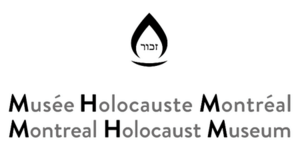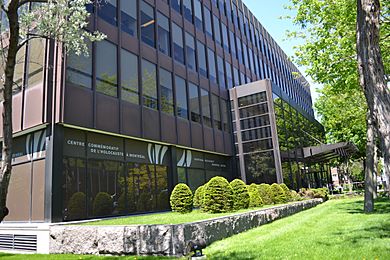Montreal Holocaust Museum facts for kids
| Musée de l'Holocauste Montréal | |
 |
|

Montreal Holocaust Museum
|
|
| Lua error in Module:Location_map at line 420: attempt to index field 'wikibase' (a nil value). | |
| Former name | Montreal Holocaust Memorial Centre Centre commémoratif de l’Holocauste à Montréal |
|---|---|
| Established | 1979 |
| Location | 5151, chemin de la Côte-Sainte-Catherine Montreal, Quebec, Canada H3W 1M6 |
| Type | Holocaust history museum |
| Public transit access | |
The Montreal Holocaust Museum (French: Musée de l'Holocauste Montréal) is a special place in Montreal, Quebec, Canada. It teaches people of all ages about the Holocaust. The museum also helps everyone understand the dangers of hate, racism, and not caring about others. Through its exhibits and programs, it encourages respect for all people and their lives. The museum started in 1979 as the Montreal Holocaust Memorial Centre. It is Canada's first and only recognized museum dedicated to the Holocaust.
Contents
History of the Museum
How the Museum Started
The Montreal Holocaust Memorial Centre began in 1979. It was founded by people who had survived the Nazi period and young members of Montreal's Jewish community. Steven Cummings led this effort.
The Centre opened in the Allied Jewish Community Services building. This building is now known as Federation CJA. It served as both a museum with a permanent exhibit and a place for remembrance.
Montreal's Connection to the Holocaust
After World War II, many Jewish immigrants came to Montreal. This made Montreal a city with one of the largest groups of Holocaust survivors in the world. The museum became known for its collection of items and stories from these local survivors.
Making the Museum Better
In 2003, the Centre was updated and made bigger. This was possible thanks to money from the government and private donations. The museum then launched its main exhibit, called "To Learn, To Feel, To Remember".
In 2010, a film called The Heart of Auschwitz was released. It was based on a special heart-shaped book shown in the museum. The film told the story of the book and the women who signed it.
In 2013, the museum created a free app for phones and other devices. This app helps visitors learn more about the exhibits. It can also be used by students in classrooms who cannot visit the museum in person. In 2014, interactive touch-screens were added to the exhibit. These screens show maps and timelines to make learning more engaging.
In 2016, the Centre changed its name to the Montreal Holocaust Museum. This new name showed that it was open to everyone and was Canada's only Holocaust museum.
Museum Collections
Objects from Survivors
Most of the museum's collection comes from items donated by local Holocaust survivors and their families. These objects help tell their personal stories.
The museum has over 12,900 objects related to life before, during, and after the Holocaust. About 85% of these items can be viewed digitally. More than 100 important objects are shown on the museum's website. Over 4,000 items are available online through the Canadian Jewish Heritage Network.
Some special objects include an urn with ashes from Auschwitz-Birkenau. This urn is always on display in the museum's remembrance room. Another unique item is the Heart from Auschwitz. This heart-shaped book contains birthday wishes made by young women in Auschwitz. A woman named Fania Fainer secretly carried it out of the camp and later gave it to the museum.
Stories from Survivors
The museum also has the largest collection of recorded stories from Holocaust survivors in Canada. This program started in 1994. Since then, the museum has recorded and saved over 800 oral histories. It continues to collect more stories. In 2016, the museum helped gather over 1,250 survivor stories from across Canada. These stories are now kept in the USC Shoah Foundation Visual History Archive.
Exhibitions to Explore
Main Exhibition: To Learn, To Feel, To Remember
To Learn, To Feel, To Remember is the museum's main exhibition. It opened in 2003 after the museum's renovation. It features many artifacts, photos, and videos. This exhibit shows Jewish culture in Europe before the war. It also tells the sad story of Jewish life during the Nazi era and the Holocaust. Finally, it shows how survivors rebuilt their lives in Montreal and Canada.
Exhibitions That Travel
United Against Genocide: Understand, Question, Prevent teaches people about genocide. It explains what genocide is, why it happens, and how to stop it. The exhibit looks at different genocides, like the Armenian genocide, the Cambodian Genocide, the Genocide of Tutsis in Rwanda, and the Holocaust. It uses survivor stories, interviews, and historical records.
"And In 1948, I Came to Canada": The Holocaust in Six Dates focuses on six important dates of the Holocaust. These dates cover the rise of the Nazi party to the freeing of concentration camps. The exhibit also shows how Canada reacted to the Holocaust. It shares stories of survivors who came to Canada. This exhibition uses items from the museum's collection and stories from Montreal survivors.
Online Exhibitions
The museum offers three exhibitions that you can explore for free online.
Building New Lives tells the stories of Jewish refugees who came to Canada after World War II. It shows how they built new homes and contributed to Canadian society.
United Against Genocide: Understand, Question, Prevent is also available online. It helps you learn about different genocides and how to prevent them.
Holocaust Life Stories shares biographies and video interviews from Holocaust survivors.
Museum Programs
Every year, the museum holds several public events. These include annual commemorations for Yom HaShoah (Holocaust Remembrance Day) and Kristallnacht. Survivors, Jewish community members, and important guests attend these events. The museum also remembers the Roma Genocide and International Holocaust Remembrance Day.
The first Roma Genocide commemoration was held in 2016. It was done with Romanipe, a local group that fights prejudice against Roma.
The museum also hosts other public events. These events teach about the Holocaust and current human rights issues. They feature guest speakers, films, workshops, and stories from Holocaust survivors.
Learning and Teaching Resources
The museum creates many educational materials for teachers. These resources help teach about the Holocaust and human rights. Tools like A Brief History of Antisemitism in Canada, The Heart From Auschwitz, and Hana’s Suitcase are available in English and French. You can find them for free on the museum's website.
The museum also holds a conference every two years. This conference helps train teachers on how to teach about the Holocaust and human rights. In 2017, the museum received a grant for a project called "Beyond the Walls of the Montreal Holocaust Museum." This project works with teacher groups, universities, and other organizations. It provides teachers across Canada with tools to teach about the Holocaust, genocide, and human rights.
Public Stances
Since 2012, the museum has spoken out on issues related to the Holocaust and human rights. It shares statements, organizes events, and uses social media. The goal is to promote diversity and public awareness. It helps connect lessons from the past to challenges we face today.
The museum has spoken against certain laws in Quebec, like Bills 60 and 62. It argued that these laws could lead to racism and prejudice against minority groups.
Working with human rights groups and minority communities is another way the museum addresses current issues. It has actively supported refugee rights through statements and events.
Museum Connections
The museum is connected with several important organizations:
See also
 In Spanish: Centro Conmemorativo del Holocausto de Montreal para niños
In Spanish: Centro Conmemorativo del Holocausto de Montreal para niños
- Antisemitism in Canada
- Museum of Jewish Montreal
- National Holocaust Monument
- List of Holocaust memorials and museums

